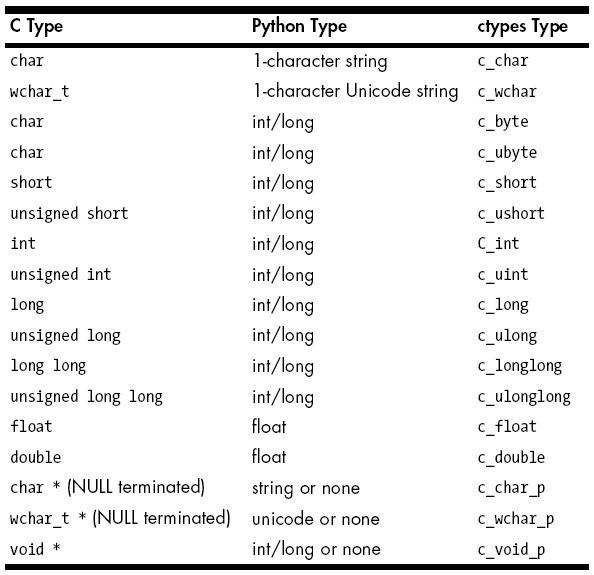1. 概述
ctypes 提供与 C 语言兼容的数据类型,可以直接调用动态链接库中的导出函数。
为使用 ctypes,必须依次完成以下步骤:
加载动态链接库
将 Python 对象转换成 ctypes 所能识别的参数
使用 ctypes 所能识别的参数调用动态链接库中的函数
2. 动态链接库加载方式
cdll
windll
oledll
它们的不同之处是动态链接库中的函数所遵守的函数调用方式(calling convention)以及返回方式。
cdll 用于加载遵循 cdecl 调用约定的动态链接库;windll 用于加载遵循 stdcall 调用约定的动态链接库;oledll 与 windll 的唯一不同是默认其载入的函数统一返回 Windows HRESULT 错误编码。
函数调用约定
函数调用约定是指函数参数入栈的顺序、哪些参数入栈、哪些通过寄存器传值、函数返回时帧的回收方式(由调用者负责清理,还是被调用者负责清理)、函数名称的修饰方法等。
常见的调用约定有
cdecl和stdcall两种。在《程序员的自我修养 -- 链接、装载与库》一书的第 10 章有对函数调用约定的更详细介绍。
cdecl规定函数参数列表以从右到左的方式入栈,并且由函数的调用者负责清除帧上的参数。stdcall的参数入栈方式与cdecl一致,但由被调用者负责清理帧。stdcall是 Win32 API 函数所使用的调用约定。
3. 示例
Linux:
>>> import ctypes>>> libc = ctypes.CDLL("libc.so.6")>>> libc.printf.argtypes = [ctypes.c_char_p]>>> libc.printf(b"Hello, %s!\n", b"World")Hello, World!14或者:
>>> import ctypes>>> libc = ctypes.cdll.LoadLibrary("libc.so.6")>>> libc.printf.argtypes = [ctypes.c_char_p]>>> libc.printf(b"Hello, %s!\n", b"World")Hello, World!14其它示例:
>>> import ctypes>>> libc = ctypes.CDLL("libc.so.6") # Linux>>> libc.atoi.argtypes = [ctypes.c_char_p]>>> libc.atoi.restype = ctypes.c_int>>> libc.atoi(b"12345")12345>>> libc.time(None)16995006024. 完整示例
4.1. 编写动态链接库
// filename: foo.c
char* myprint(char *str){ puts(str); return str;}
float add(float a, float b){ return a + b;}将 foo.c 编译为动态链接库:
gcc -fPIC -shared foo.c -o foo.so4.2. 使用 ctypes 调用 foo.so
#FILENAME:foo.py
from ctypes import *
foo = CDLL('./foo.so')
myprint = foo.myprintmyprint.argtypes = [POINTER(c_char)] # 参数类型为 char 指针myprint.restype = c_char_p # 返回类型为 char 指针res = myprint(b"hello ctypes")print(res)
add = foo.addadd.argtypes = [c_float, c_float] # 参数为两个 floatadd.restype = c_float # 返回类型为 floatprint(add(1.3, 1.2))执行结果:
$ python3 foo.pyhello ctypesb'hello ctypes'2.55. ctypes 数据类型与 C 数据类型对照表

6. 查找动态链接库
>>> from ctypes.util import find_library>>> find_library("m")'libm.so.6'>>> find_library("c")'libc.so.6'>>> find_library("bz2")'libbz2.so.1.0'7. 函数返回类型
函数默认返回 C int 类型,如果需要返回其它类型,那么需要设置 restype 属性。
xxxxxxxxxx>>> from ctypes import *>>> from ctypes.util import find_library>>> libc = cdll.LoadLibrary(find_library("c"))>>> strchr = libc.strchr>>> strchr(b"abcdef", ord("d"))21151987>>> strchr.restype = c_char_p>>> strchr(b"abcdef", ord("d"))b'def'>>> strchr(b"abcdef", ord("x"))8. 回调函数
在 Python 中,定义回调函数类型,类似于 C 中的函数指针。比如:
xxxxxxxxxxvoid (*callback)(void* arg1, void* arg2)定义为
xxxxxxxxxxcallack = CFUNCTYPE(None, c_void_p, c_void_p) 其中,None 表示返回类型是 void,也可以是其它类型;其余两个参数与 C 中的回调参数一致。
使用如下方式注册回调函数:
xxxxxxxxxxdef _callback(arg1, arg2): # do sth # ... # return sth
cb = callback(_callback)另外,使用 ctypes 可以避免 GIL 带来的问题。
回调函数示例如下:
xxxxxxxxxx// callback.c
void showNumber(int n, void (*print)()){ (*print)(n);}编译成动态链接库:
xxxxxxxxxxgcc -fPIC -shared -o callback.so callback.c测试代码如下:
xxxxxxxxxx# FILENAME: callback.py
from ctypes import *
_cb = CFUNCTYPE(None, c_int)
def pr(n): print("this is %d" % n)
cb = _cb(pr)
callback = CDLL("./callback.so")showNumber = callback.showNumbershowNumber.argtypes = [c_int, c_void_p]showNumber.restype = c_void_p
for i in range(10): showNumber(i, cb)执行:
xxxxxxxxxx$ python3 callback.pythis is 0this is 1this is 2this is 3this is 4this is 5this is 6this is 7this is 8this is 9 9. 结构体和联合
Union(联合体/共用体):
Union 中可以定义多个成员,其大小由最大的成员决定。
Union 成员共享同一块内存,一次只能使用其中一个成员。
对某个成员赋值,将覆盖其它成员的值(因为它们共享一块内存。前提是成员所占字节数相同,当成员所占字节数不同时只覆盖相应字节上的值,比如对 char 成员赋值不会将整个 int 成员覆盖掉,因为 char 只占一个字节,而 int 占四个字节)
所有成员都从低地址开始存放
结构体和联合必须从 Structure 和 Union 继承,子类必须定义 __fields__ 属性,__fields__ 属性必须是二元组列表,包含 Field 名称和 Field 类型,Field 类型必须是 ctypes 类型,比如 c_int, 或者其它继承自 ctypes 的类型,比如结构体、联合、数组、指针。
xxxxxxxxxxfrom ctypes import *
class Point(Structure): __fields__ = [ ("x", c_int), ("y", c_int), ]
def __str__(self): return "x={0.x}, y={0.y}".format(self)
class Rect(Structure): __fields__ = [ ("upperleft", Point), ("lowerright", Point), ]
def __str__(self): return "upperleft:[{0.upperleft}], lowerright:[{0.lowerright}]".format(self)
point = Point(x=10, y=20)print("point1:", point)rect = Rect(upperleft=Point(x=1, y=2), lowerright=Point(x=3, y=4))print("rect1:", rect)运行:
xxxxxxxxxx$ python3 test.pypoint1: x=10, y=20rect1: upperleft:[x=1, y=2], lowerright:[x=3, y=4]10. 数组
定义有 10 个 Point 元素的数组:
xxxxxxxxxxTenPointsArrayType = Point * 10初始化和使用数组:
xxxxxxxxxxfrom ctypes import *
TenIntegersArrayType = c_int * 10array1 = TenIntegersArrayType(*range(1, 11))
for i in array1: print(i)11. 指针
pointer() 可以创建指针,Pointer 实例的 contents 属性返回指针指向的内容。
xxxxxxxxxx>>> from ctypes import *>>> i = c_int(42)>>> p = pointer(i)>>> p<__main__.LP_c_int object at 0x7f260cdff268>>>> p.contentsc_int(42)可以改变指针指向的内容:
xxxxxxxxxx>>> i = c_int(99)>>> p.contents = i>>> p.contentsc_int(99)可以按数组的方式访问,并且改变值:
xxxxxxxxxx>>> p[0]99>>> p[0] = 22>>> ic_int(22)12. 传递指针或引用
很多情况下,C 函数需要传递指针或引用,ctypes 也完美支持这一点。
byref() 用来传递引用参数,pointer() 也可以完成同样的工作,但是 pointer() 将创建实际的指针对象,如果不需要指针对象,用 byref() 将快很多。
xxxxxxxxxx>>> from ctypes import *>>> i = c_int()>>> f = c_float()>>> s = create_string_buffer(b'\000' * 32)>>> print(i.value, f.value, repr(s.value))0 0.0 b''>>> libc = CDLL("libc.so.6")>>> libc.sscanf(b"1 3.14 Hello", b"%d %f %s", byref(i), byref(f), s)3>>> print(i.value, f.value, repr(s.value))1 3.140000104904175 b'Hello'13. 可变字符串
如果需要可变字符串,那么使用 create_string_buffer():
xxxxxxxxxx>>> from ctypes import *>>> p = create_string_buffer(3) # create a 3 byte buffer, initialized to NUL bytes>>> print(sizeof(p), repr(p.raw))3 b'\x00\x00\x00'>>> p = create_string_buffer(b"Hello") # create a buffer containing a NUL terminated string>>> print(sizeof(p), repr(p.raw))6 b'Hello\x00'>>> print(repr(p.value))b'Hello'>>> p = create_string_buffer(b"Hello", 10) # create a 10 byte buffer>>> print(sizeof(p), repr(p.raw))10 b'Hello\x00\x00\x00\x00\x00'>>> p.value = b"Hi">>> print(sizeof(p), repr(p.raw))10 b'Hi\x00lo\x00\x00\x00\x00\x00'14. 为 c_char_p、c_wchar_p、c_void_p 赋值
只改变它们指向的内存地址,而不改变内存的内容:
xxxxxxxxxx>>> from ctypes import *>>> s = b"Hello, World">>> c_s = c_char_p(s)>>> print(c_s.value)b'Hello, World'>>> print(c_s)c_char_p(140494369176272)>>> c_s.value = b"Hi, there">>> print(c_s.value)b'Hi, there'>>> print(c_s)c_char_p(140494369176752)>>> print(s)b'Hello, World'15. 数据都改变
xxxxxxxxxx>>> from ctypes import *>>> i = c_int(42)>>> print(i)c_int(42)>>> print(i.value)42>>> i.value = -99>>> print(i)c_int(-99)>>> print(i.value)-9916. 遇到的问题
16.1. 当动态库的导出函数返回 char * 时,如何释放内存
如果将 restype 设置为 c_char_p,ctypes 将返回常规的 Python 字符串对象。一种简单的方式是使用 void * 和强制转换。
string.c:
xxxxxxxxxx
char *get(void){ char *buf = "Hello World"; char *new_buf = strdup(buf); printf("allocated address: %p\n", new_buf); return new_buf;}
void freeme(char *ptr){ printf("freeing address: %p\n", ptr); free(ptr);}在 Python 中使用:
xxxxxxxxxxfrom ctypes import *
lib = cdll.LoadLibrary('./string.so')lib.get.argtypes = []lib.get.restype = c_void_plib.freeme.argtypes = c_void_p,lib.freeme.restype = None
ptr = lib.get()print(ptr)print(hex(ptr))print(cast(ptr, c_char_p).value)lib.freeme(ptr)也可以使用 c_char_p 的子类,因为 ctypes 不对简单类型的子类调用 getfunc:
xxxxxxxxxxfrom ctypes import *
class c_char_p_sub(c_char_p): pass
lib = cdll.LoadLibrary('./string.so')lib.get.argtypes = []lib.get.restype = c_char_p_sublib.freeme.argtypes = [c_char_p_sub]lib.freeme.restype = None
ptr = lib.get()print(ptr)print(ptr.value)lib.freeme(ptr)访问 value 属性将返回字符串。在本示例中,可以将 freeme 的参数改为更通用的 c_void_p,它接受任何指针类型或整型地址。
16.2. 如何将包含 '\0' 的 char* 转换成 Python 字符串
原文地址:
How do you convert a char * with 0-value bytes into a python string?
翻译如下:
使用 POINTER(c_char) 获取指向二进制数据数组的指针。为将其放进字符串,只需获取其切片,因为对于 ctypes 指针,数组索引可按预期工作:
xxxxxxxxxxfrom ctypes import *
s = b"hello\x00world" # create a string containing null bytessz = len(s)p = c_char_p(s) # obtain a pointer of various typesp2 = cast(p, POINTER(c_char))address = cast(p, c_void_p).value
# by default it is interpreted as null-terminatedprint(p.value)# various methods of explicitly specifying the full lengthprint(p2[:sz])print(string_at(p, size=sz))print((c_char * sz).from_address(address).raw)